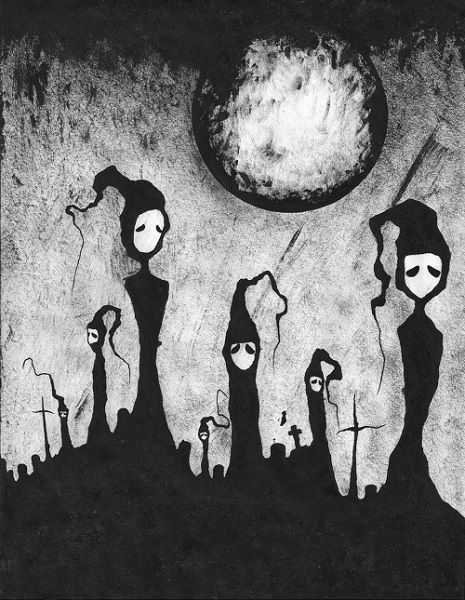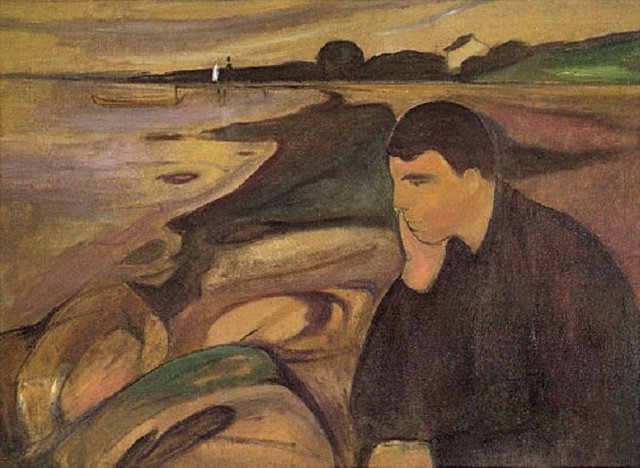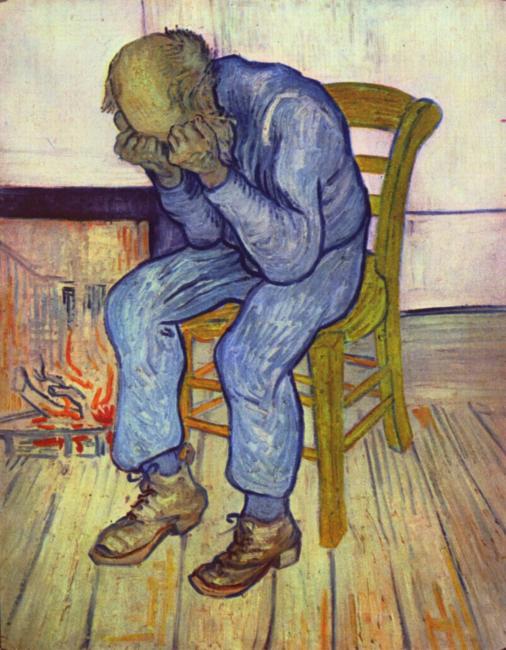About depression and melancholy
It is therefore a text about the depression that is not there. For an emptiness. For a lack. For one absence. Various ways are available to a subject to be convinced that he or she has depression, i. e. to recognize yourself as belonging to some shared suffering. Naturally, this attribution has its medical expediency, but here we will not even deal with, nor dispute this expedience. We will only welcome psychiatric meaning "depressive syndrome" - being a syndrome, i.e. a population of certain symptoms, depression may occur within a variety of mental disorders, i.e. may have appeared on the mental terrain of something else that isn't a depression. A long time ago, Otto Fenichael, a student of Sigmund Freud, has indicated that in a sense depression occurs in almost all neuroses, it is "the preferred" from the subject a way of declaring a sufferer to give his suffering a name.

Psychiatry is obliged to indicate what the subject has, such is its constitution. Psychoanalysis is obliged to indicate what the subject is not. Psychiatry obliges the patient to have depression. Psychoanalysis allows him to suffer, obliging him to name this suffering autonomously. Therefore, in psychoanalytic terms, depression is possible as one of the signs of suffering, but it is not suffering alone. And there is hardly a word that could mark the deprivation's emptiness. This is an emptiness that is terrifying, especially with its unattainability. To face what is there is always easier for a subject than to face what is not. Depression may be the most unbearable presence of the absent. Psychoanalytic clinic has found the melancholy nature of depression. This does not mean that there is a certain equality between depression and melancholy, but that the lack of depression is a special, melancholy lack. It is this melancholy lack that is the view that the current text will suggest to depression. The melancholy lack refers to everything that is not said about depression. I am obliged to emphasize this difference not because of terminological malignancy, but because the depressive complaint can tell us very little about depressive suffering. So let's make such a distinction - if the complaints are depressive, then the suffering is melancholy.

"Melancholy" by Edvard Munch
What is the nature of melancholy lack?
The void has settled in the melancholic entity in a merciless way, just as the emptiness is settling in the world in the loss of a loved one. "In the mourning, the world is the one who has become poor and empty, in melancholy it is the self myself," Freud tells us. Melancholy has a special relationship with mourning. Melancholy mourning is not a mourning for someone dead but something dead. Freud's great merit in melancholy-depressive suffering is his discovery that the melancholic one experiences a part of himself as dead. This is not an experience of simple disability or insult, of something that I can resign, compensate, or experience. It is a fundamental niliness from which nothing grows for a bleeding wound that does not heal as it is nourished solely by the pulse of pain. This is the void that the melancholic bears without being able to name. The melancholic man fails to overlook a beloved version of himself for which he believes he was taken away. It is in this place that melancholy is close to mourning - one never understands what it actually loses when it loses a love. Melancholy comes to replace this unknown part of the lost.
This unrecognizable but robbing loss marks the love, the relationship, the world, and the language of the melancholy.
His love disappointments are common because they are mixed with identities and in this sense are conceived by the expectation that the other contains everything that was taken away ("the other is my lack"). The relationship with love objects is more important than the objects themselves, since each next object is assigned the reading that it is precisely that it will bring the subject to its complete integrity. This love fantasy leads to an agonizing dynamism, starting from the idealisation of the beloved and reaching to the boredom, the disappointment, the hatred and the retreat within himself. The withdrawal of interest from the outside world and the exhaustion of desire marks all ties with the world. In its melancholy man is alienated from the familiar meaning of words, things, relationships. The world is experienced as a deer, mechanized, frozen, alien. This experience is often also valid for the image itself in the mirror. This is also associated with the painful experience of being unable to live life, even in its simplest household requirements. The inability to love and live is accompanied by deep guilt experiences and reproaches. The melancholy is its greatest judge. No one could convict it or destroy it and complain the way it could.

"Old Man in Sorrow" by Vincent Van Gogh
The meaning of the melancholic seems arbitrary, casual, as if away from words and things. Melancholic speaks, but it is "disconnected" from the word, it does not belong to the world, it seems to be alien and fake, and it speaks by an automatic mechanism without being able to communicate with the words it pronounces. The void of the melancholic is unreadable. The word is reduced to empty speech, meaningless and meaningless. That's not to say that the melancholy does not use the language, but the language has stopped serving it. In his melancholy, man is in a particular way obscene, his reasonings are deprived of innocence and naivety, making life bearable. Why, before it becomes accessible to one another, the truths of life, one must get sick, is one of the questions Freud would ask about melancholy. Often the melancholy produces series of life explanations with extreme precision and depth, but also with the bileful paraphernalia (it is hardly accidental that from Greek "melancholia" means "black bile") of a prematurely recognized transient life of man. He actually explains life that can not live. He addresses life from the position of a dead man who has already experienced the life he could have lived. In melancholy is always in some form of clinging to a "previous life", a "lost paradise", in a place where his life was possible, in a place without missing. The melancholic one knows best what it is to be able to want only what is missing, which is dead, or that has never been there. Depressions of others can not indicate the depression of an individual. "Someone suffers from depression," he says frequently and uncritically. We will only agree to the first part of such a request and will post it like this - "Someone Suffers". Depression is the infallible and banalled cry of loneliness. Because we are so equal in our weeping and so alone in our suffering. But the sufferer knows better this ...
That lines striked right to my chest.
The academic definitions of depression are not even come close to what depression really is. It feels different in each of us, but something is almost generic, if you don't learn to confront it, it becomes a terminal illness.
I am or been there.
I appreciate how realistic you described depression.
Well... just self-reflection. :D Thank you for the comment :) Yes, it is hard the academic definition to catch the feeling. In this connection I want to share with you one poem by Edgar Allan Poe about depression:
“Alone”
From childhood’s hour I have not been
As others were—I have not seen
As others saw—I could not bring
My passions from a common spring—
From the same source I have not taken
My sorrow—I could not awaken
My heart to joy at the same tone—
And all I lov’d—I lov’d alone—
Then—in my childhood—in the dawn
Of a most stormy life—was drawn
From ev’ry depth of good and ill
The mystery which binds me still—
From the torrent, or the fountain—
From the red cliff of the mountain—
From the sun that ’round me roll’d
In its autumn tint of gold—
From the lightning in the sky
As it pass’d me flying by—
From the thunder, and the storm—
And the cloud that took the form
(When the rest of Heaven was blue)
Of a demon in my view—
Sorry for answering after decades. I've been crazy busy at work.
it's curious. I discovered this poem in my teenage years. If I am now an existentialist, at that time It was worse. So as soon as I read it, it pierced my soul because perfectly described the feeling.
How lonely depression is, how cold makes us feel inside with all the demons.
Thanks for sharing, suddenly felt melancholy :(
-nevermore-
Thank you for an interesting rather poetic post.
I have little time for psychoanalysis and psychiatry having experienced their quackery first hand. The psychiatry profession as it is presently constituted is nothing less than a means for keeping people on the capitalist treadmill. Have a little CBT and some anti-depressants and we'll have you back at work in no time. I can speak from personal experience and recollections of friends when you explain your depression in terms of what is happening in the world e.g. the the near term extinction of humanity that is threatened by global warming/our pollution and destruction of the living planet then psychiatrists get rather defensive and dismiss the reasons for your depression/melancholia and resort to sophistry to try and control you.
Art, poetry, music, literature, the wonder of nature can all help one cope with depression/melancholia more so than the quacks who pose as guardians of our mental health.
only psychologists are able to analyze the images, great posts
@godflesh
Thank you, @hamidi103
Depression is classified as a mood disorder. It may be described as feelings of sadness, loss, or anger that interfere with a person's everyday activities. Thanks for sharing, I have learnt alot from your post.
I am glad to hear that :)
Nice post @godflesh , very interesting..
Thanks :)
Nice post
Thank you
I read many authors here but your articles are so different.. And i admit as non native speaker you are 1st one whose articles are difficult to understand for me..
But infrmations are quite interesting.. I learn new terminologies related to depression like. melancholy and new definations which i neva heardbefore..
Thanx for sharing valueable stuff..
I am depression patient since many years and fighting with it as i neva consult any doctor.. Only bearing pain..
Hey,
I really like how you characterized the subjectivity of derpession, your post make use of some very nice language constructs. An interesting take on the psychoanalytic view of depression. I have recently been drawn to the existential schools outlook on depression. I believe these views are marked by a long-standing debate on to what extent depression is necessary. I think psychoanalysis'stance is to reduce suffering, whereas existentialsm tries to give suffering meaning. What is your opinion on that? I wrote a blogpost in similar vein. Let me know what you think.
This post has received gratitude of 12.55% from @appreciator courtesy of @godflesh!
Nice mesaj
:)